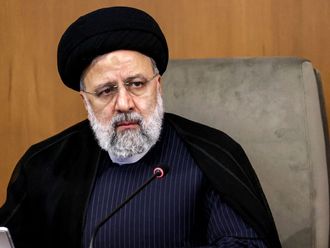Budapest: The cost of caring for millions of refugees and displaced persons more than tripled in the past decade amid turmoil from Syria to the Central African Republic, straining the international community’s efforts to meet humanitarian needs.
Global spending on humanitarian assistance rose to $21 billion last year from $14.5 billion in 2013 and just $4.7 billion in 2004, UN Under-Secretary-General for Humanitarian Affairs Valerie Amos said in an interview in Budapest Tuesday.
The rising cost reflects both immediate refugee crises and the many situations in which long-term support is required for people uprooted by war and other turmoil. A refugee on average is now displaced for 17 years as conflicts drag on without a political solution, Amos said.
“The way humanitarian work was planned was that you’d go in, you’d stabilize a situation and you’d get development and longer term stability,” Amos said in an interview at a conference in the Hungarian capital. “This is not happening. You’re staying longer and you’re not coming out.”
The United Nations is asking member nations to provide $16.4 billion for UN humanitarian programs in 2015, 27 percent more than the previous year’s appeal. Donors last year provided $9.4 billion to the UN, as well as providing direct country-to- country aid.
“The rising scale of need is outpacing our capacity to respond,” Amos said in launching the 2015 UN appeal in December.
In June, the UN High Commissioner for Refugees reported the number of refugees, asylum-seekers and internally displaced people worldwide exceeded 50 million people for the first time in the post-World War II era.
Syria topped Afghanistan as the country with the largest refugee population under United Nations care. There are 78 million people in 31 countries that rely on humanitarian aid to survive, Amos said.
“Nearly 80 percent of our work now is in countries that have what call protracted crises,” Amos said, citing Syria, Iraq, South Sudan and the Central African Republic. “Five years ago we didn’t have a crisis in Syria. Four years later, we now have a crisis with more than 12 million people in the country who are extremely vulnerable.”
Syria’s conflict is creating a humanitarian challenge in Lebanon, Jordan, Turkey and Egypt, Amos said. Six million Syrians are internally displaced, four million are registered refugees and many have fled but are unaccounted for, she said.
The UN is assessing the scale of humanitarian need in eastern Ukraine, Amos said, adding that her institution has opened three offices in the region. German Chancellor Angela Merkel and Hungarian Prime Minister Viktor Orban discussed preparations for a possible wave of refugees from Ukraine, the leaders said in Budapest on Monday.
“At the moment we’ve been very concerned to see the ongoing violence in the east,” Amos said. “It’s been very difficult to get to some parts. The insecure environment is making that very difficult.”










